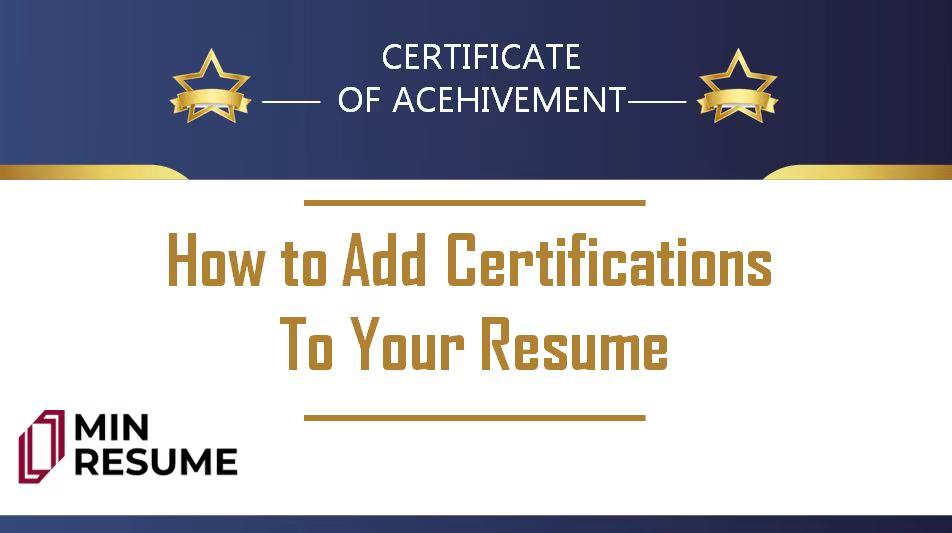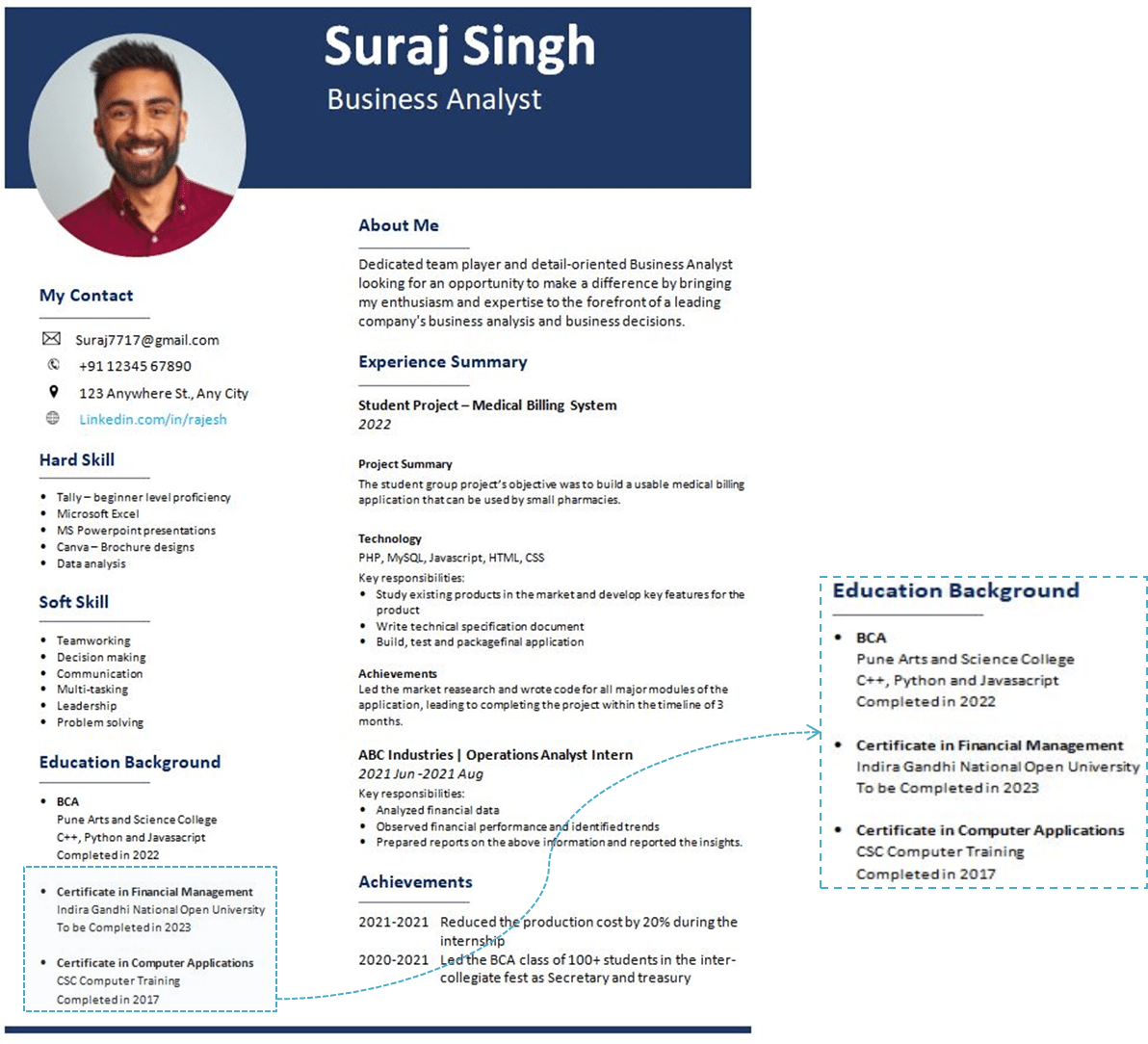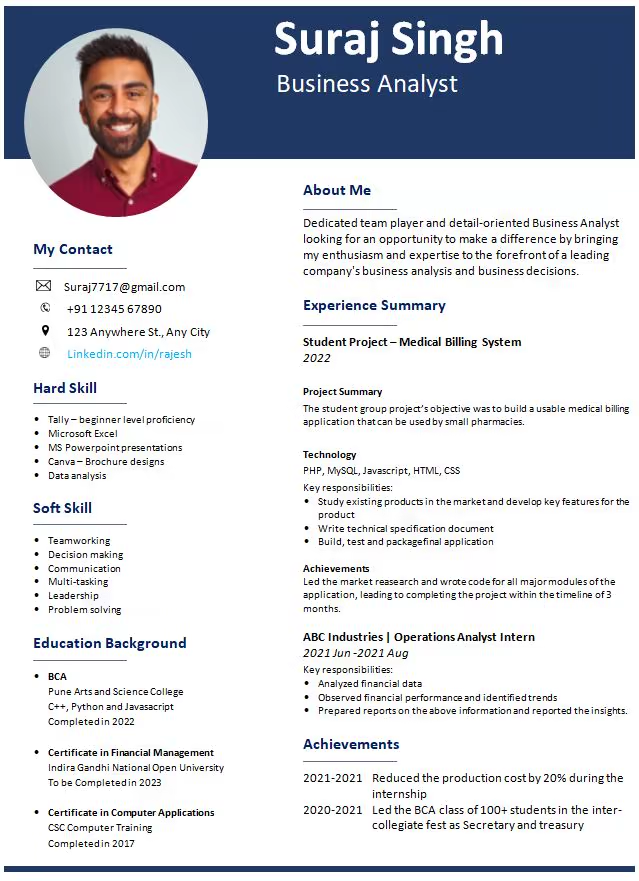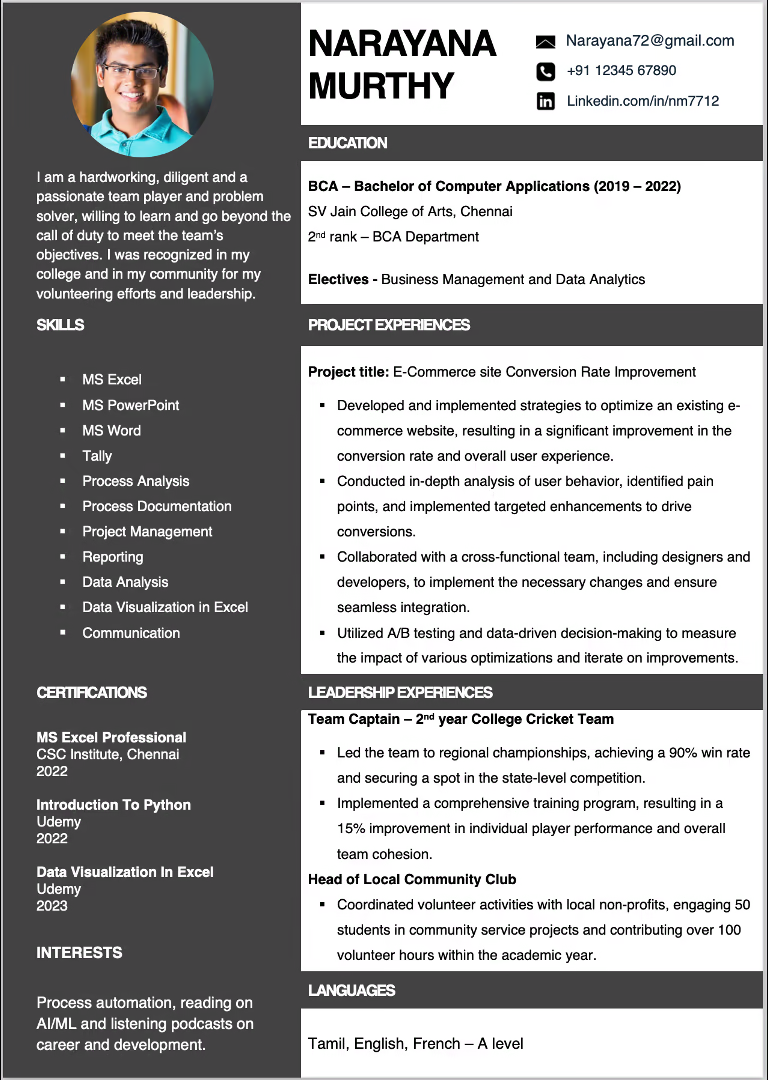How to list certificates on your resume - with examples

11 Aug 2023

Why are we writing this article?
As a recent college graduate, you stand on the threshold of an exciting and challenging journey into the professional world. This transition can be both exhilarating and daunting, as you navigate the landscape of job applications, interviews, and career decisions. One powerful tool that can significantly enhance your chances of success is strategically showcasing certifications on your resume.
I believe that every recent graduate has the potential to shine brightly in their chosen career path. With the insights shared in this article, I hope to contribute to your journey and provide you with a valuable resource that supports you in achieving your dreams.
At its core, this article is a roadmap designed to help you navigate the world of certifications, making informed decisions that resonate with your career objectives. By embracing the advice shared here, you'll be better positioned to demonstrate your commitment to professional growth, showcase your dedication to staying current in your field, and ultimately capture the attention of prospective employers.
Let's dive right in!
What will you learn in this article
1. The value of certifications - Understand why certifications are essential for recent college graduates
2. Strategic Listing Techniques: Learn how to effectively list certifications on a resume
3. Real-Life Application: Explore practical examples of how to incorporate certifications into a resume
Why certifications are important
In today's competitive job market, certifications have emerged as powerful assets that can significantly impact a recent graduate's career trajectory. As you embark on your professional journey, understanding why certifications matter is key to making informed decisions that shape your success.
Demonstrating Specialized Skills and KnowledgeCertifications serve as tangible evidence of your expertise in specific areas. As a recent graduate, you might lack extensive work experience, making it challenging to showcase your capabilities to potential employers. Certifications bridge this gap by showcasing your commitment to mastering specialized skills and knowledge, giving employers confidence in your ability to contribute meaningfully from day one.
Compensating for Limited Work ExperienceWhile your academic accomplishments are a testament to your dedication and potential, certifications offer a practical demonstration of your skills beyond the classroom. They provide concrete examples of your hands-on training and practical understanding of industry concepts. By listing relevant certifications, you provide employers with a more comprehensive view of your abilities, helping you stand out among other candidates with similar educational backgrounds.
Industry Recognition and CredibilityCertifications are often developed and endorsed by respected industry organizations and institutions. When you hold a recognized certification, you are aligning yourself with established standards of excellence within your field. This recognition extends beyond the resume, enhancing your credibility during job interviews and interactions with potential employers. Certifications can serve as conversation starters, allowing you to discuss your achievements and experiences in a context that holds weight within your industry.
College Syllabus May Not Cover All Industry-Relevant SkillsWhile colleges provide a solid foundation, they may not encompass the ever-evolving and specialized skills demanded by today's industries. This is where certifications come into play. They fill the gaps left by traditional education, equipping you with practical skills and up-to-date knowledge that align directly with your chosen career path. Certifications serve as targeted learning opportunities that can set you apart in a competitive job market.
Expand Network that Can Land You OpportunitiesCertifications open doors beyond just skill acquisition. Many training organizations offer employment support or referrals as part of their certification programs. These connections can be invaluable, especially for graduates navigating a challenging job market. Whether you're seeking your first job or exploring new opportunities, the network you build through certifications can be a powerful catalyst for securing interviews and landing meaningful roles.
Certifications Offer a Great Opportunity to Pivot CareersImagine being able to switch careers with a focused leap. Certifications make this a reality. Professionals often find themselves drawn to new domains, and certifications provide a structured path to acquire the necessary expertise. This holds true for recent graduates too. If your degree doesn't align with your desired field, certifications allow you to pivot and demonstrate your commitment to your new direction.
Stand Out Among Similarly Academically Qualified CandidatesIn a sea of resumes, certifications act as beacons, guiding employers' attention toward your unique qualifications. They showcase your proactive approach to skill development and your dedication to going the extra mile. In a competitive job market, certifications can be the differentiating factor that convinces employers of your readiness to contribute and learn.
Demonstrate a Passion for Learning and Continued UpskillingEmployers value candidates who display a hunger for growth. Certifications exemplify your commitment to lifelong learning and professional development. By continuously upskilling and seeking new certifications, you convey a genuine passion for staying current and adaptable in a rapidly changing world.
Certifications Help Keep One's Learning Appetite Fresh and SharpCertification pursuits go beyond adding credentials to your resume; they foster a mindset of continuous learning. The structured learning journey that certifications offer ensures you stay engaged and motivated throughout the process. This appetite for learning not only enhances your skills but also contributes to personal satisfaction and a sense of accomplishment.
In the next sections of this guide, we'll delve deeper into how to strategically list and present certifications on your resume, allowing you to harness their full potential and create a compelling narrative of your professional readiness and aspirations.
If you haven't read the article we wrote on "How to create your best resume in 2023", we highlighly recommend that you read since it touches on all aspects of a resume in the moderen era.
Benefits of Listing Certifications on a Resume
As you embark on the journey of crafting a compelling resume, incorporating certifications can make a significant difference in how potential employers perceive your qualifications. This section explores the manifold benefits of showcasing certifications on your resume:
Catching Employers' Attention
Imagine you're a recent graduate applying for a marketing assistant position. Your resume highlights your degree in Marketing and a relevant internship, but it might not immediately stand out in a stack of applications. Now, let's say you've earned a Google Ads Certification and a HubSpot Content Marketing Certification. These certifications not only underscore your theoretical knowledge but also demonstrate your practical expertise in essential marketing tools. Employers, seeking candidates who can hit the ground running, are more likely to pause and explore your resume further due to these certifications.
Leading to Higher Earning Potential
Suppose you're a newly certified Project Management Professional (PMP) looking for project management roles. You've invested time and effort to master the intricacies of project management, and your resume showcases this accomplishment. Research indicates that PMP-certified professionals typically earn higher salaries than their non-certified counterparts. When a potential employer sees your PMP certification listed prominently on your resume, they're more inclined to recognize your expertise and consider you for positions with better compensation packages.
Showcasing a Commitment to Ongoing Learning
Consider a recent graduate aiming for a software development role. You possess a degree in Computer Science, but you want to demonstrate that you've kept pace with the ever-evolving tech landscape. By including certifications such as the AWS Certified Developer – Associate and the Microsoft Certified: Azure Fundamentals, you communicate your commitment to staying current in the field. These certifications signal that you're not just relying on your academic foundation; you're actively pursuing specialized knowledge and skills that align with modern industry demands.
In the subsequent sections, we'll delve into practical strategies for effectively incorporating certifications into your resume, optimizing their presentation, and harnessing their impact to amplify your career prospects.
Choosing Relevant Certifications
As you embark on the journey of selecting certifications to enhance your resume, a strategic approach is crucial. This section guides you through the process of choosing certifications that align with your career goals and aspirations.
Identifying Target Industries and Roles
Selecting the right certifications begins with a clear understanding of your desired industries and roles. Consider the following steps to identify the certifications that will make your resume shine:
Research Industries of Interest
Start by exploring industries that align with your passions and strengths. Are you drawn to the tech sector, healthcare, finance, or perhaps marketing? Research the latest trends, challenges, and skill requirements within these industries to gain insights into which certifications are highly regarded.
Define Your Ideal Roles
Once you've identified industries of interest, narrow your focus to specific roles that resonate with your career aspirations. Are you aiming for a project management position, a data analyst role, or a digital marketing specialist? Understanding the skills and knowledge required for your target roles will guide you in selecting certifications that make you a prime candidate.
Examine Job Postings
Review job postings for your desired roles to identify common certification requirements. Many job descriptions explicitly list preferred or required certifications. Take note of certifications mentioned frequently across different postings – these are strong indicators of industry expectations and can significantly boost your resume's appeal.
Leverage Professional Networks
Engage with professional networks, both online and offline, to gather insights from individuals working in your target industries. Seek advice from mentors, attend industry events, and participate in relevant online communities. These interactions can provide valuable perspectives on certifications that are highly valued and respected within specific fields.
Consider Transferable Skills
Sometimes, certifications that are not directly related to your target roles can still offer valuable transferable skills. For instance, if you're aiming for a managerial position, a Certified ScrumMaster (CSM) certification might not be mandatory, but it can showcase your leadership and project management abilities.
By diligently researching industries, roles, and certification requirements, you'll be equipped to make informed decisions about the certifications that best align with your career path. In the upcoming sections, we'll delve further into the selection process and strategies to present your chosen certifications effectively on your resume.
Researching In-Demand Certifications
With a clear understanding of your target industries and roles, the next step is to research and identify certifications that hold genuine value within your chosen field. This section equips you with effective strategies for discovering in-demand certifications:
Resources for Finding Certifications
Numerous resources can help you uncover certifications that are highly sought-after within your industry. Websites like LinkedIn, Glassdoor, and Indeed often feature lists of top certifications recommended for specific roles. For instance, if you're interested in cybersecurity, these platforms may highlight certifications like Certified Information Systems Security Professional (CISSP) and Certified Ethical Hacker (CEH) as industry standards.
Tips for Evaluating Reputation and Credibility
When evaluating certifications, it's essential to prioritize those that are recognized and respected by employers and professionals. Look for certifications accredited by well-established organizations or industry bodies. For instance, the Project Management Institute (PMI) accredits the prestigious Project Management Professional (PMP) certification, widely acknowledged in project management circles.
Consider certifications that require comprehensive exams or practical assessments. The rigor of these evaluations often indicates a certification's credibility. For instance, the Google Ads Certification involves rigorous exams that validate your expertise in online advertising practices.
Examples - How to find certifications
Linkedin: Explore the "Skills & Endorsements" section of LinkedIn profiles similar to your desired role. This can reveal certifications held by professionals in your field, giving you insight into which credentials are valued.
Industry Forums: Participate in online forums related to your industry. Engage in discussions and ask for recommendations for certifications that have proven beneficial for fellow professionals.
Professional Associations: Industry-specific associations often provide guidance on certifications that align with their field. For instance, the American Marketing Association (AMA) may endorse certifications like the Digital Marketing Institute Certified Digital Marketing Professional for aspiring marketers.
By leveraging these resources and evaluating certifications based on reputation and credibility, you'll be better equipped to make informed decisions that enhance your career trajectory. In the upcoming sections, we'll delve into assessing certification content and the practical benefits they offer.
Formatting Certifications on a Resume
Presenting your certifications on your resume requires careful formatting to ensure they catch the reader's eye and effectively communicate your expertise. This section delves into the art of formatting certifications to maximize their impact:
Where to Place Certifications
The strategic placement of certifications within your resume is essential to highlight their significance and align with industry expectations. Consider the following guidelines for optimal placement:
Incorporate a Dedicated Certifications Section
Begin by creating a distinct section titled "Certifications" or "Professional Certifications." This approach ensures your certifications receive the attention they deserve and enables hiring managers to quickly locate and assess your specialized skills.
How to list training and certifications
You would have gained a lot of certifications during your time at the college. Now is the time to take a stock of them.
If you have a lot of certifications, you should limit to only those certifications that are relevant to the role you are applying to.
To include certifications on your resume, you could choose to create a new section called Training and Certifications or just include in the education section, like in the image below.
How to List Certifications

Align with the Relevance
If a specific certification strongly relates to the job you're applying for, consider placing it in a prominent position. If you're applying for a data analyst role and possess a Microsoft Certified: Data Analyst Associate certification, position it immediately after your summary or objective statement. This immediate visibility emphasizes your tailored qualifications and captures the recruiter's attention early on.
Example - Align Certifications with relevance
Software Developer Resume: For a software developer, a Cisco Certified Network Associate (CCNA) certification might be showcased in the certifications section to underscore networking proficiency.
Project Manager Resume: A Certified ScrumMaster (CSM) certification is a valuable asset for a project manager. Placing it near the top of the resume highlights your agile project management skills.
Remember that while certifications are a critical component, they should complement your other qualifications. Ensure that your certifications section is well-organized and doesn't overshadow other important resume elements.
How to Format Certifications on Your Resume - Formatting and Styling Tips
Formatting and styling certifications on your resume can significantly enhance their visual impact and ensure that they are easily comprehensible to potential employers. Follow these expert tips to showcase your certifications with clarity and professionalism:
Format Certification Names, Issuing Bodies, and Dates
When listing certifications, ensure a consistent and reader-friendly format. Begin with the certification's full name, followed by the issuing organization or body in parentheses. Conclude with the completion date or the phrase "Present" if you're currently certified. For example:
Utilize Bullet Points for Readability
Presenting your certifications in bullet point format enhances readability and allows hiring managers to quickly scan your qualifications. Each bullet point should represent a distinct certification, creating a visually appealing and organized layout. For instance:
Examples of Effective Formatting
Consider the following examples, showcasing how different professionals can format certifications for maximum impact:
Business Analyst Resume:
Non Voice Process Analyst Resume:
Remember, the goal is to present your certifications in a clear and organized manner, enabling recruiters to quickly grasp your qualifications. The formatting you choose should align with your resume's overall design and aesthetics.
How to Keep Certifications Current
While earning certifications can significantly bolster your resume, it's equally essential to maintain their relevance over time. This section emphasizes the importance of keeping your certifications up to date and offers guidance on effectively showcasing their currency:
Importance of Renewal
Certifications are a testament to your expertise, but their value can diminish if they become outdated. Highlight the significance of continuous learning and the professional growth that renewal signifies. Mention how staying current with industry advancements demonstrates your commitment to staying at the forefront of your field.
Consider Including Expiration Dates
If your certifications have expiration dates, consider including them in your resume. This transparency showcases your dedication to maintaining your qualifications and alerts employers to your certifications' validity. For instance:
Healthcare Professional Resume: A healthcare professional might stress the importance of maintaining certifications like Advanced Cardiac Life Support (ACLS) and Basic Life Support (BLS) to ensure their readiness to respond to critical situations.
IT Specialist Resume: An IT specialist can emphasize the ongoing learning required for certifications like CompTIA A+ or Cisco Certified Network Associate (CCNA) to adapt to evolving technology landscapes.
By showcasing your commitment to staying current and renewing your certifications, you assure potential employers that your skills remain relevant and valuable. In the next section, we'll explore strategies for effectively integrating your certifications into your interview conversations.
Read - How to list skills on your resume
We have written exhaustively about how to list skills on your resume. You might want to give it a read. That article gives you a lot of insights into what skills to include, soft vs hard technical skills, etc.
You should also include training programs that did not result in certifications, if the training is relevant to the role you are applying to.
As for the details of the training and certifications, when you completed the training and the awarding instituitions name are sufficient. If the training program is greater than a few weeks, you can also mention the duration of the training program.
You can include the Project Experiences section right below the education or right below the career objective statement. We have so many examples that show how to list your project experiences. Take a look at the them for some ideas.
Read - How to Include Hobbies and Interests on your Resume
50 Hobbies and Interests for Resume
There is a special article we wrote on how to include hobbies and interests on resume for everyone. We highlighly recommend that you read since it has about 100 examples of hobbies and intersts.
Summary and Conclusion
In this comprehensive guide, we've explored the transformative role that certifications can play in the career journey of recent college graduates. By strategically integrating certifications into your resume, you have the power to distinguish yourself in a competitive job market and position yourself as a candidate of exceptional value.
Key Takeaways from the Guide
Elevating Your Profile: Certifications are your gateway to demonstrating specialized skills and knowledge beyond your college education. They compensate for limited work experience and grant you an industry-recognized edge.
Pivoting Careers: Certifications hold the potential to ignite career shifts. Stories abound of professionals and recent graduates who have transitioned into new domains by acquiring certifications that underscore their newfound expertise.
Standing Out and Making an Impact: Certifications amplify your resume by catching employers' attention, leading to higher earning potential, and exemplifying your commitment to lifelong learning.
Empowerment Through Certifications
As a recent graduate, you stand at the precipice of opportunity. Seize this moment by embarking on a journey of continuous improvement and professional growth through certifications. Each certification earned signifies your unwavering dedication to mastering your craft and enriching your value proposition to potential employers.
A Call to Action
Embrace certifications as your catalyst for success. Explore the certifications relevant to your desired industry and role, harnessing their ability to bridge skill gaps that traditional education might leave untouched. Emphasize your willingness to learn, adapt, and evolve within your chosen field.
Fueling Ongoing Learning
The journey doesn't end with certification attainment; it's just the beginning. Cultivate a mindset of perpetual growth, and commit to renewing your certifications to ensure their relevance. Showcasing your commitment to staying up to date further cements your status as an invaluable asset to any organization.
Additional Resources
To aid you in your pursuit of excellence, here are some valuable resources:
Certification Programs: Explore reputable certification programs aligned with your industry and interests. Websites such as LinkedIn Learning, Coursera, and Udemy offer a plethora of courses that can expand your skill set.
Professional Organizations: Engage with industry-specific associations that offer certifications and networking opportunities. These include the Project Management Institute (PMI), CompTIA, and Salesforce.
Further Reading:
Expand your knowledge with articles, books, and online resources. Consider titles like "Certification Study Guides" and insightful articles from industry publications.
The path to a fulfilling and successful career begins with a commitment to continuous learning and a dedication to showcasing your expertise. By leveraging the power of certifications, you not only open doors to remarkable opportunities but also pave the way for a future marked by professional fulfillment and growth.
Remember, your journey is uniquely yours, and every certification you earn is a testament to your unwavering pursuit of excellence. Your potential is boundless, and the world eagerly awaits the impact you will make. Embrace certifications, and let your journey begin.
Did you enjoy this article? Then these below might also be of interest to you
1. Resume writing demystified - One of our most popular articles that goes throug a lot of misconceptions and clarifies them.
2. Resume format for freshers - If you are a recent college graduate, you would enjoy reading this article as it would provide you with information specific to preaparing your first resume.
3. 50 Hobbies and Interests to put on your resume - If you wondered what hobbies and interests you should put on your resume, this article can help you become more strategic about this fun topic.

